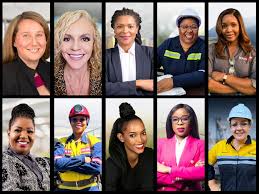Mining Other

Minerals Council celebrates women in mining sustainability heroes

Leaders from member companies and stakeholders in the mining industry participated in conversations on the progress and challenges experienced by women active in mining.
A key topic was UN Women: 30 Years from Beijing Declaration and Platform for Action.
“The sustainability heroes we are celebrating today embody the industry’s commitment to going beyond the call of duty to ensure we continue to make the world a better place. Our view is simple. Sustainability is doing business in such a way that the outcomes are good for people and the planet,” said Sibanye-Stillwater stakeholder relations executive VP Thabisile Phumo.
UN Women South Africa lead and women’s economic empowerment specialist Ayanda Mvimbi noted that UN Women, on March 6, released the Beijing plus 30 report that highlights pivotal steps and major stumbling blocks; how a world in crisis weighs on progress; and that equality must reach all women and girls.
“The question we should all be asking is whether we are making progress in the world and as South Africa in the mining sector towards achieving a world where men and women, boys and girls are equal?” she said.
While women have made significant progress throughout the years, Mvimbi highlighted the challenges still facing women in the mining sector, including gender-based violence and sexual harassment in the workplace.
“In the mining sector, we have seen notable growth over the past decades, yet there are persistent challenges in achieving gender equality in overall representation, occupational leadership representation and access to business opportunities,” said Mvimbi, adding that women-owned businesses had limited access to procurement and market opportunities.
Moreover, she pointed out that, in 2024, the mining sector contributed about R432-billion to the country’s GDP.
“Do we know how much of that amount went into the hands of women and closed the gender wealth gap? What policy mechanisms do we need to enforce to ensure that we do better?
“We have not surpassed the 30% mark, except in education we have just passed 30% at 32%. What this means is that there is a lot of work to be done,” she expressed.
Mvimbi described the limited economic power for women as a structural, socioeconomic and political challenge that needed to be addressed at the highest level of government and business decision-making.
This implied that transformative and systemic changes were needed, moving beyond superficial initiatives to change mindsets, policy, legislation, approaches and budgets, she said.
She highlighted five priorities to make faster gains for women and prepare for an uncertain future.
These include closing the accountability gap; elevating women’s voices; closing the financial gap; harnessing technology; and establishing shock-proof services and infrastructure.
Mvimbi noted that the mining sector had put in place a number of mechanisms to drive gender parity.
“We need to stay on course and strive for better results in promoting gender transformative economies.”
She noted that the mining council aimed to, subsequently, close the gender gap and remove systemic and persistent barriers; provide women with adequate and relevant capacity support to take up existing opportunities; increase investment to accelerate progress and promote a gender transformative mining sector; promote and advocate for women’s leadership; invest in science, technology, engineering and mathematics; and ensure that workplaces were free of violence and discrimination and spoke out against gender stereotypes, bias and discrimination.
“Unfortunately, we have a long way to go to eliminate bullying, harassment, racism, and gender-based violence from our workplaces and communities. But I am encouraged by leaders standing up and acting against perpetrators. At Sibanye-Stillwater, we recognise the role women play in sustainability and our programmes are geared at creating an inclusive environment within and outside our operations,” added Phumo.
Speaking on sustainability in mining, she noted the importance of partnership and collaboration, emphasising the need for collaboration among industry colleagues, suppliers, government, communities, non-governmental organisations and other stakeholders.
“To achieve this, we need to have more women in the room when decisions are made, and more women working in every nook and cranny of our industry,” she said.
Mvimbi encouraged attendees to join UN Women’s global campaign #ForAllWomenAndGirls, as well as UN Women's rallying cry for action on March 8, International Women’s Day.
“We will be judged not by our words but by our actions. Because gender equality is the way forward – not just for women, not just for girls, but for the future of humanity.”












